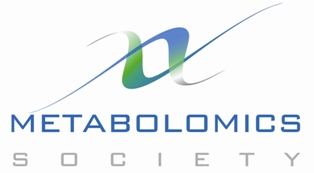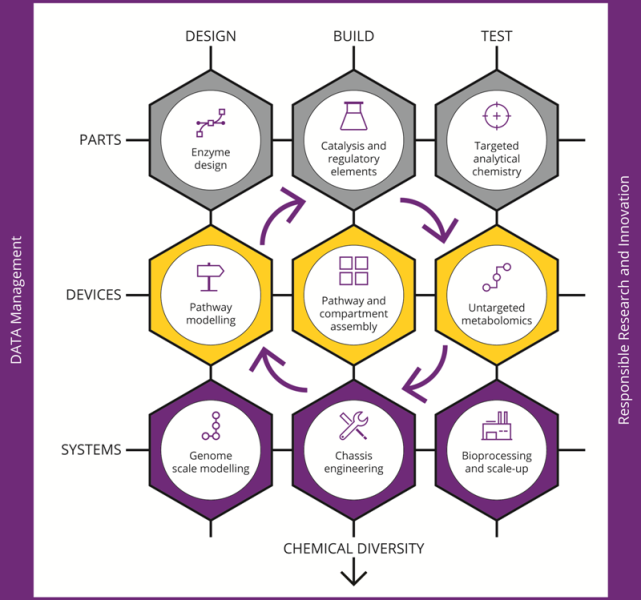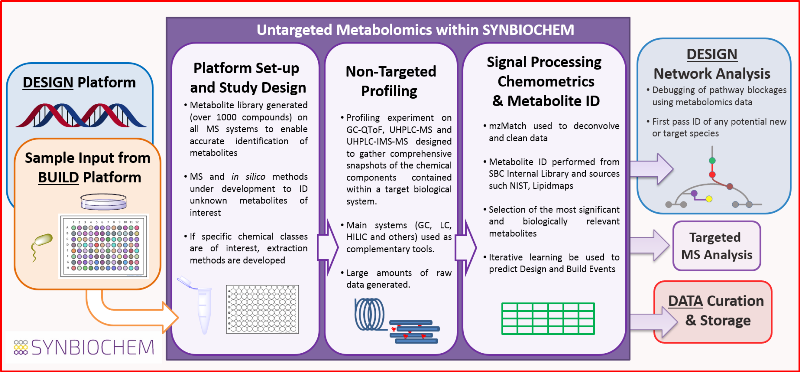
TMIC and the Metabolomics Society
Issue 61 - September 2016
CONTENTS:
Online version of this newsletter:
http://www.metabonews.ca/Sep2016/MetaboNews_Sep2016.htm

 |
| Published
in partnership between TMIC and the Metabolomics Society Issue 61 - September 2016 |
|
CONTENTS: |
|
|
 |
| TMIC
Services |
 |
Metabolomics Society News |
| |
Centre Spotlight
|


| |
MetaboInterview
|
| Analytical
Chemist, The Metabolomics Innovation Centre, and
Research Associate, Department of Chemistry, University
of Alberta, Canada |
|
 |
Biography Paulina de la Mata is an Analytical Chemist working for The Metabolomics Innovation Centre (TMIC), in addition to being a Primary Research Assistant/Postdoctoral Fellow in Dr. Harynuk’s group in the Department of Chemistry at the University of Alberta. She works with TMIC clients in the design of studies and experiments, developing and optimizing analytical methods, running samples, maintaining instruments, and processing data using a variety of statistical tools. Her current research interests include chemometrics, multiway analysis, exploratory analysis, MATLAB programming, and developing, testing, and adapting new metabolomics methods to GC×GC-TOFMS/FID GC-MS/MS. She has been working for several years, developing chemometric tools and exploring the capabilities and limitations of multidimensional gas chromatography for metabolomic and other analyses. She has a diverse work history including working in Spain and Denmark with HPLC-CAD and FTIR data with chemometrics to obtain models to distinguish adulterations in olive oils as well as being a cosmetics and health care buyer for Comercial Mexicana (retail store) in Mexico. Paulina de la Mata received a Bachelor's degree in Chemistry in 2002 and an MBA in 2004 from Universidad de las Americas in Puebla, México. She obtained a Master's degree in 2007 and a Ph.D. in Chemistry in 2011 from the University of Granada, Spain. Since 2011, she has worked at the University of Alberta, Canada, in the Department of Chemistry, as a Research Associate. |



 |
Metabolomics Current
Contents
|
Metabolomics Events
|
| 12-16 Sep 2016 |
The Summer School will offer students theoretical sessions with lectures by experts, and hands-on data analysis aimed to deepen the theoretical and practical knowledge for using the main tools available to integrate metabolomics data. Main Topics
Target Audience The Summer School is targeted to researchers at an early stage in their career, from Biological Sciences, Health Sciences and other different background (Including bioinformatics and mathematics) who are interested in learning about both technical and cheminformatics tools to integrate metabolomics data. Applications The course is funded by the Regional Sardinian government and registration will be free of charge for all attendees. Selection will be based on CV and a letter stating the motivations for attending the course and future research plans of candidates. A letter of reference from the current supervisor must also be attached to the application. Registration includes course material, lunches and coffee breaks (not accommodation expenses). For selected participants contribution or reimbursement will be considered. Organizing Committee
For detailed information about the Summer School in Sardinia, visit http://sites.unica.it/metabolomicaclinica/events/scientific-school-2016/. |
| 12-23 Sep 2016 |
|
| 23-25 Sep 2016 |
Metabolomics, the comprehensive study of small molecules, provides remarkable insights into the underlying biochemistry of disease pathways for basic science and clinical applications. San Diego has been a bed of much of this fundamental knowledge and houses several institutions, which have led the way to many breakthroughs in our understanding of metabolites. We are very pleased to be able to host the meeting in San Diego and welcome many of the leading scientists and investigators throughout the world for this exciting meeting. See more here: www.isnforefronts.org/sandiego About ISN Forefronts Symposia: They focus on emerging and groundbreaking research. They gather nephrologists and active investigators from surrounding medical areas to explore new scientific domains and review the latest developments in kidney disease. |
| 10-12 Oct 2016 |
For further information and registration details, please visit https://www.mri.bund.de/de/ueber-das-mri/veranstaltungen/max-rubner-conference/2016/. |
| 12-14 Oct 2016 |
|
| 15-16 Oct 2016 |
New this year: A focused workshop is available to a limited group of individuals based on availability. Scholarships for scholars and junior faculty are available. For further information and registration details, please visit https://matrix.secureserverdot.com/metabolomics_2016/home_live1.htm. |
| 31 Oct-4 Nov 2016 |
Standard: £1950 This week long course aims to cover how to perform a metabolic profiling experiment, from start to finish. It covers study design, sample preparation, the use of mass spectrometry for global profiling and targeted methodologies and data analysis. It combines lectures and tutorial sessions to ensure a thorough understanding of the theory and practical applications. Topics covered include:
|
| 3-4 Nov 2016 |
The course will be led by experts in the field and include significant hands-on experience using both the Q Exactive and LTQ Orbitrap instruments to perform,
For further information and registration details, please visit http://www.birmingham.ac.uk/facilities/metabolomics-training-centre/courses/metabolite-identification.aspx or contact bmtc@contacts.bham.ac.uk. |
| 15-18 Nov 2016 |
Academic: £800 Industry: £1150 A lecture based course detailing an overview of metabolic phenotyping including the use of NMR spectroscopy and Mass Spectrometry, with insights from the experts at Imperial College and collaborators from all over the world. Lectures will cover data acquisition and analysis with some advanced statistical workshops for more hands-on participation for attendees. There will also be examples of real life applications from the research at Imperial College and their collaborators. Day 1: Registration followed by session 1 which will cover an analytical technology (either NMR or MS) for metabolic profiling. A laboratory tour of the facilities will follow. Day 2: Session 2 will cover the alternative analytical technique (NMR / MS) and will be followed by session 3 which will introduce the theory to statistical analysis. Day 3: Session 4 covers more advanced chemometrics, such as OPLS and O2PLS and includes hands-on workshops. Session 5 will introduce metabolite identification in both NMR and MS and cover some tips and tricks to avoid common pitfalls. Day 4: The final day will cover some of the real life applications of NMR and MS for metabolic phenotyping. http://www.imperial.ac.uk/imperial-international-phenome-training-centre/courses/metabolic-phenotyping-in-disease-diagnosis-and-personalised-health-care/ or contact Dr Liz Want (iptc@imperial.ac.uk) for further information. |
| 22-25 Nov 2016 |
Standard: £1100 This 4 day course provides a comprehensive overview of data analysis for metabolic profiling studies with data acquired from NMR spectroscopy and Liquid Chromatography-Mass Spectrometry. It combines lectures and tutorial sessions to ensure a thorough understanding of the theory and practical applications. Day 1: Introductory lectures and tutorials regarding the pre-processing of data acquired via NMR and LC-MS. Day 2: Lectures and tutorials introducing exploratory chemometrics approaches, including PCA. Day 3: Lectures and tutorials covering advanced chemometrics techniques including PLS and Orthogonal PLS. Day 4: The next step - computational tools to aid metabolite identification and pathway analysis. http://www.imperial.ac.uk/imperial-international-phenome-training-centre/courses/hands-on-data-analysis-for-metabolic-profiling/ or contact Dr Liz Want (iptc@imperial.ac.uk) for further information. |
| 23-25 Nov 2016 |
For further information and registration details, please visit http://www.birmingham.ac.uk/facilities/metabolomics-training-centre/courses/q-exactive.aspx or contact bmtc@contacts.bham.ac.uk. |
| 28 Nov to 2 Dec 2016 |
Overview: Pre-processing, statistical analysis, and annotation of metabolomics data is a complex task. The Workflow4metabolomics online infrastructure provides a user-friendly and high-performance environment with advanced computational modules for building, running, and sharing complete workflows for LC-MS, GC-MS, and NMR analysis (Giacomoni et al., 2015). Goals: During this one-week course, participants will learn how to use the W4M infrastructure to analyze their own dataset.Morning sessions will be dedicated to methodology and tools. Afternoon sessions will be devoted to tutoring. Target audience: LC-MS, GC-MS and NMR experimenters (e.g., biologists, chemists) Registration fee: 750 € (Academia) and 1400 € (Industry); Fees include accommodations but not travel expenses Language: English Pre-registration: Monday 30 May 2016 to Friday 15th July 2016 at Workflow4Experimenters course 2016 Contact: contact@workflow4metabolomics.org For further details, visit http://workflow4metabolomics.org/training/W4Mcourse2016. |
| 8-10 Dec 2016 |
On behalf of the steering committee,
the Institute of Cardiometabolism and
Nutrition (ICAN) is delighted to
invite you to the fourth ICAN
Conference Series on Precision
Medicine in Cardiometabolic and
Nutrition-related Diseases, which will
take place in Paris, France, from
December 8-10, 2016. Program: http://www.ican-series.com/program For further details, visit http://www.ican-series.com/. |
| 12-13 Dec 2016 |
Quality Assurance and Quality Control in Metabolic Phenotyping Venue: Birmingham Metabolomics Training Centre, School of Biosciences, University of Birmingham, Birmingham, UK This 2-day course will provide a comprehensive overview of the application of quality assurance (QA) and quality control (QC) in metabolic phenotyping. The course is aimed at students and researchers who are actively working in the field. Experts who have developed the application of QA and QC procedures within the field will lead the course. It will include both theoretical and practical components to
For further information and registration details, please visit http://www.birmingham.ac.uk/facilities/metabolomics-training-centre/courses/quality-phenotyping.aspx or contact bmtc@contacts.bham.ac.uk. |
| 13-17 February 2017 |
EMBO Practical Course on Metabolomics Bioinformatics for Life Scientists Venue: European Bioinformatics Institute (EMBL-EBI) - Training Room 2 - Wellcome Genome Campus, Hinxton, Cambridge, CB10 1SD, United Kingdom Application opens: Monday August 08 2016 Application deadline: Friday November 11 2016 Participation: Open application with selection Contact: Maria Bacadare Goitia Registration fee: £350 Overview This course will provide an overview of key issues that affect metabolomics studies, handling datasets and procedures for the analysis of metabolomics data using bioinformatics tools. It will be delivered using a mixture of lectures, computer-based practical sessions and interactive discussions. The course will provide a platform for discussion of the key questions and challenges in the field of metabolomics, from study design to metabolite identification. Audience This course is aimed at PhD students, post-docs and researchers with at least one year’s experience in the field of metabolomics who are seeking to improve their skills in metabolomics data analysis. Participants ideally must have working experience using R (including a basic understanding of the syntax and ability to manipulate objects). For more information, please visit https://www.ebi.ac.uk/training/events/2017/embo-practical-course-metabolomics-bioinformatics-life-scientists-3. |
| 17-18 May 2017 |
Conference on Food and Nutritional Metabolomics for Health Venue: The Ohio State University, Columbus, OH, USA The purpose of this two-day event is to disseminate state-of-the-art knowledge in the field of food and nutritional metabolomics and foster networking and collaboration among colleagues and industry partners. For more information please visit: https://discovery.osu.edu/focus-areas/foods-for-health/events/conference-2017.html. |
| 26-29 June 2017 |
Metabolomics 2017 Venue: Brisbane, Australia  The 13th Annual International Conference of the Metabolomics Society will be held in Brisbane from June 26-29, 2017. Check back for updates in the coming months at http://metabolomics2017.org. |
Metabolomics Jobs |
This is a resource for
advertising positions in metabolomics. If you
have a job you would like posted in this
newsletter, please email Ian Forsythe (metabolomics.innovation@gmail.com).
Job postings will be carried for a maximum of
four issues (eight weeks) unless the position
is filled prior to that date.
Jobs Offered
| Job Title | Employer | Location | Posted | Closes | Source |
|---|---|---|---|---|---|
| Scientific Employee
(Postdoc) as Coordinator for
Ecometabolomics Platform |
German Centre for Integrative Biodiversity Research (iDiv) | Jena,
Germany |
28-Aug-2016 | 16-Sep-2016 |
Friedrich-Schiller-Universität
Jena |
| Scientific Programmer
(Genetics) |
University of Cambridge | Cambridge, United Kingdom | 24-Aug-2016 | 21-Sep-2016 |
Metabolomics
Society |
| Assistant/Associate
Professor of Plant Metabolic
Biochemistry |
Cornell University | Ithaca, New York, USA | 19-Aug-2016 | 18-Sep-2016 |
Metabolomics Society |
| Postdoctoral Fellow |
University of Johannesburg | Johannesburg,
South Africa |
18-Aug-2016 | Until filled |
Metabolomics Society |
| Director, Mass
Spectrometry and Bio-Analytical
Operations |
Stemina Biomarker Discovery | Madison,
Wisconsin, USA |
15-Aug-2016 | 15-Nov-2016 |
Metabolomics Society |
| Postdoctoral Research
Fellow in Marine Metabolomics |
Weizmann Institute of Science | Rehovot,
Israel |
10-Aug-2016 | |
Weizmann Institute of Science |
| Researcher Position |
Centro Cardiologico Monzino | Milan,
Italy |
8-Aug-2016 | |
Centro Cardiologico Monzino |
| Postdoctoral Fellow in
Metabolomics/Metabolite Identification |
University of Missouri Metabolomics Center | Columbia,
USA |
8-Aug-2016 | |
University of Missouri |
| Metabolomics Research
Specialist |
St. Jude Children’s Research Hospital | Memphis, Tennessee, USA | 29-Jul-2016 | Until filled |
Metabolomics Society Jobs |
| Metabolomics Staff
Scientist |
St. Jude Children’s Research Hospital | Memphis, Tennessee, USA | 29-Jul-2016 | Until filled | Metabolomics Society Jobs |
| Director, Metabolite
Profiling Core Facility |
Whitehead Institute | Cambridge, Massachusetts, USA | 27-Jul-2016 | 31-Oct-2016 | Metabolomics Society Jobs |
| Postdoctoral Fellow in
Clinical Metabolomics |
Concordia University | Montreal,
Canada |
14-Jul-2016 | 31-Oct-2016 or until
filled |
Concordia University |
|
Ian J. Forsythe Double AB, MSc Editor, MetaboNews Department
of Computing Science
University of Alberta 221 Athabasca Hall Edmonton, AB, T6G 2E8, Canada Email: metabolomics.innovation@gmail.com Website: http://www.metabonews.ca Twitter: http://twitter.com/MetaboNews Google+: https://plus.google.com/118323357793551595134 Facebook: http://www.facebook.com/metabonews |
This newsletter is
published in partnership between The
Metabolomics Innovation Centre
(TMIC, http://www.metabolomicscentre.ca/) and
the Metabolomics Society (http://www.metabolomicssociety.org)
for the benefit of the worldwide
metabolomics community.
|